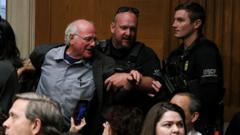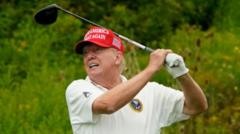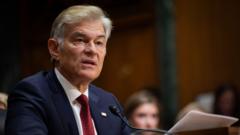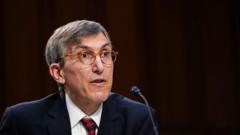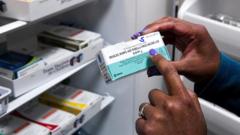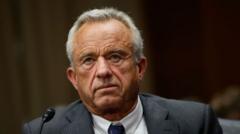The US Department of Health and Human Services (HHS) has canceled $500 million in funding designated for mRNA vaccines aimed at combating diseases like COVID-19, recently announced by Health Secretary Robert F. Kennedy Jr. This decision impacts 22 projects from leading pharmaceutical companies including Pfizer and Moderna, stirring significant debate on vaccine safety and efficacy.
RFK Jr Terminates $500 Million mRNA Vaccine Funding Amid Controversy

RFK Jr Terminates $500 Million mRNA Vaccine Funding Amid Controversy
US Health Secretary Robert F. Kennedy Jr. halts funding for mRNA vaccine projects citing safety concerns.
The abrupt cancellation comes as Kennedy, known for his vaccine skepticism, expressed concerns that mRNA technology poses more risks than benefits. Critics argue that this move undermines effective tools developed during the COVID-19 pandemic. Peter Lurie, a former FDA official, emphasized that this decision represents a retreat from using one of the most promising resources available to tackle future pandemics.
Kennedy defended his stance by claiming that mRNA vaccines are ineffective against upper respiratory infections and contribute to viral mutations. However, health experts stress that virus mutations occur independently of vaccination status. Dr. Paul Offit highlighted the remarkable safety and effectiveness of mRNA vaccines, critical in preventing severe outcomes from viruses such as COVID-19.
In line with this funding decision, HHS aims to pivot towards alternative vaccine platforms that offer stronger safety records. This strategic shift continues a series of controversial actions taken by Kennedy since taking office, including the dismissal of members from a vaccine advisory committee and adjustments to vaccination recommendations for children and pregnant women.
Kennedy's move raises questions on the future of vaccine development in the US and presents a challenge in preparing for potential pandemic threats. As discussions unfold, the broader implications of this decision on public health and immunization policy are likely to dominate future discourse.
Kennedy defended his stance by claiming that mRNA vaccines are ineffective against upper respiratory infections and contribute to viral mutations. However, health experts stress that virus mutations occur independently of vaccination status. Dr. Paul Offit highlighted the remarkable safety and effectiveness of mRNA vaccines, critical in preventing severe outcomes from viruses such as COVID-19.
In line with this funding decision, HHS aims to pivot towards alternative vaccine platforms that offer stronger safety records. This strategic shift continues a series of controversial actions taken by Kennedy since taking office, including the dismissal of members from a vaccine advisory committee and adjustments to vaccination recommendations for children and pregnant women.
Kennedy's move raises questions on the future of vaccine development in the US and presents a challenge in preparing for potential pandemic threats. As discussions unfold, the broader implications of this decision on public health and immunization policy are likely to dominate future discourse.








